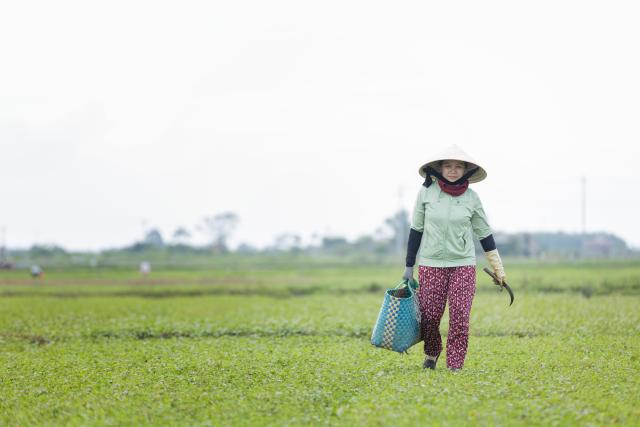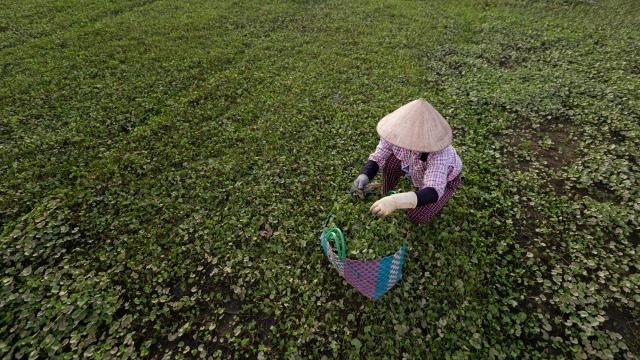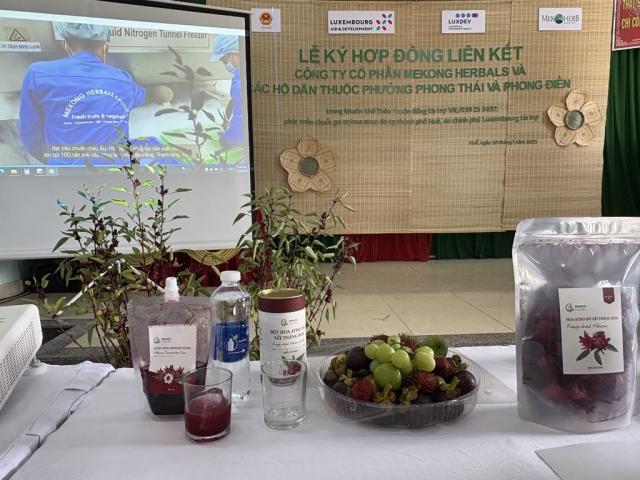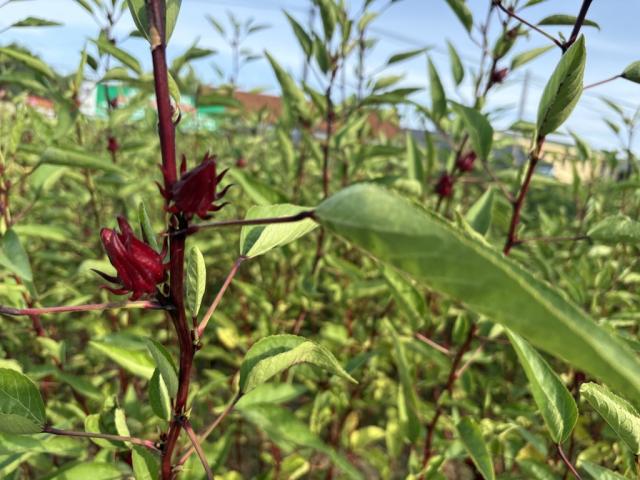Engaging with the private sector: a new approach for greater impact
Vietnam 31.07.2025 Project
©D&D media

Can co-financing companies foster scale-up and inclusive and sustainable growth without continuous support from donors after the project ends? This belief underpins LuxDev’s engagement with the private sector. In partnership with the Vietnamese company Mekong Herbals, and within the framework of the Finance for resilience project, the Agency is implementing a new approach to promote sustainable farming practices, which aims to enhance crops quality, increase market value and enable farmers access to more lucrative markets, ultimately improving their resilience in Hue city, central of Vietnam.
A new approach to development cooperation
Due to climate change, small-scale farmers in Hue city are increasingly affected by floods and storms that devastate their fields, reduce crop yields, and lead to food insecurity and economic losses. Additionally, similar to many farmers in Vietnam, those in Hue are accustomed to chemical-based agriculture – which may be effective in the short term but ultimately depletes the soil.
In contrast, the market is increasingly demanding organic products or those produced using sustainable agricultural practices. Unfortunately, many local farmers are unable to sell their produce because of a mismatch between their production methods and evolving market preferences.
In this context, the conventional approach to development cooperation, which often relies on donor-direct support, typically focuses on raising awareness, providing training, and establishing mechanisms such as agricultural advisory services. While these initiatives aim to assist agriculture-dependent communities at small scales, they frequently fall short of addressing the critical need for market development, which is essential for sustainable growth.
Through the Finance for resilience project, LuxDev has chosen the “market system development” (MSD) approach to ensure farming remains a viable livelihood. Various empirical research shows that MSD, by fostering partnerships with the private sector, strengthens the overall market system, enabling farmers and small enterprises access profitable markets, secure fair pricing, and achieve income stability.

©D&D media
The red hibiscus sector: an example of a win-win partnership
As a first step, the project identified promising sectors whose crops are suitable for sustainable agriculture and resilient to climate change. Hibiscus emerged as one. A market analysis then led to the identification of Mekong Herbals, a company based in Ho Chi Minh City, which expressed interest in integrating a range of hibiscus-based products into its business model.
LuxDev now relies on Mekong Herbals to establish direct business linkages with farmers, introduce sustainable practices, and leverage their technical expertise and processing investments. Through this collaboration, the project provides essential initial funding to support the transition to new practices that farmers may not have access to independently. On the other hand, this strategy incentivises the private sector partner to mitigate risks during the early implementation stages, encouraging confident investments from farmers and processors.
“To encourage farmers to adopt sustainable practices, Mekong Herbals has committed to establishing five-year farming contracts with local farmers, providing training, and creating a nursery and an organic fertiliser processing facility. This will grant farmers access to high-quality seedlings and enable them to exchange agricultural waste for organic fertiliser, enhancing crop production and reducing input costs. The farming contracts also guarantee a fixed purchase price for hibiscus flowers above the average market rate (13,000 Vietnamese dong or 42 cents per kg), with a 10% annual increase. Our ultimate goal is to invest in a production line while ensuring farmers adhere to the contract model and scale operations to 120 hectares of organic red hibiscus”, explains David TRAN, founder of Mekong Herbals.
Gallery viewer
Private sector engagement: tools to make it work
To ensure the success of this approach, Pascal FABING, LuxDev’s expert in private sector and innovation, has developed a new partnership tool tailored to working with businesses: “Working in partnership with a company requires alignment and close monitoring of the impact achieved. Co-financing in the form of grants is offered to companies such as Mekong Herbals to reduce the initial risk they take. To make sure that business and impact go hand in hand, payments are made based on results achieved”, he explains.
In this business case, the Luxembourg Cooperation is co-financing 40% of the investment required to develop the hibiscus sector in Hue. The financial support has been calculated based on an economic scenario that will enable the company to achieve its profitability objectives in the long term. Subsidies are paid according to the number of hectares cultivated.
“In working on development projects that utilise the MSD approach, it is crucial to balance commercial viability and inclusion, as both are essential for the project's success. For me, engaging with the private sector through MSD is a journey that involves understanding the market system, building trust with business partners, and facilitating systemic change. This process will also generate valuable data and insights that will guide our strategies for future interventions, ensuring we achieve both our goals of commercial viability and commitment to inclusion”, concludes Hien BUI THI MAI, chief technical advisor of the Finance for resilience project.
About the project
The project Finance for resilience is funded by the Grand Duchy of Luxembourg and implemented by LuxDev, the Luxembourg Development Agency.
Explore more
Discover the latest news from LuxDev and stay updated on the progress of cooperation projects and programmes implemented by the Agency.
All news-

Laos 27.02.2026
When minutes matter: strengthening cardiac emergency response in Lao PDR through advanced cardiovascular life support training
When minutes matter: strengthening cardiac emergency response in Lao PDR through advanced cardiovascular life support training -

Laos 27.02.2026
Khammouane Provincial Hospital launches laparoscopic gynaecological surgery
Khammouane Provincial Hospital launches laparoscopic gynaecological surgery


